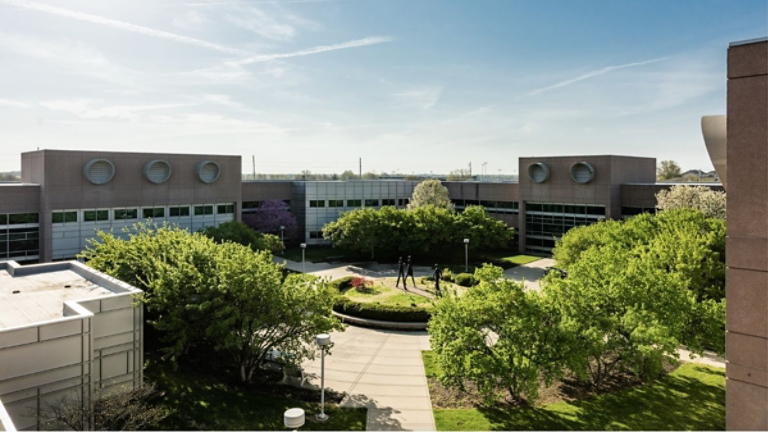Customer Story
Elevating Efficiency and Comfort at Pittsburg State University
Pittsburg State University (PSU) in Kansas collaborated with Trane to overcome multiple deferred maintenance challenges and optimize its academic environment. With a focus on improving comfort, energy efficiency, and indoor air quality (IAQ), Trane implemented a holistic and data-driven approach, starting with a proof-of-concept pilot to assess building performance.

Quick Facts
- Location
- Pittsburg, Kansas
- Industry
- Higher Education
- Products
- Air Handlers • Controls
- Topics
- Efficiency • Optimal Comfort • IEQ • Decarbonization
- Services
- Energy Analysis & Monitoring • Upgrading

Challenge
Multiple deferred maintenance issues challenged Pittsburg State University (PSU), a comprehensive regional university providing undergraduate and graduate programs in southeast Kansas. Challenges included aging facility systems, as well as unreliable and inconsistent heating, ventilation and air conditioning (HVAC) system performance.
The school required new facility management solutions that would optimize the academic environment and increase energy efficiency. The solutions also needed to demonstrate a clear return on investment and provide ongoing support for overloaded facilities staff.
The Kansas Board of Regents was already collaborating with Trane® to further career and technical education in the state, so they were eager to see the results of a partnership between Trane and PSU to address the university’s challenges. The board understood that—armed with advanced analytics—progressive facility management teams can make much more informed decisions for project identification, prioritization, justification, and verification.
Solution
Leaders at PSU partnered with Trane to focus on improvements to increase building comfort, reduce overall operations and maintenance costs, decrease energy costs and increase energy efficiency.
Proof-of-Concept Pilot
Trane’s holistic approach started with a proof-of-concept pilot that uniquely positioned the energy services company as an active extension of the PSU team. Focused on the university’s key business challenges, the team conducted a complete assessment of four buildings: the Kansas Technology Center (KTC), Axe Library, Robert W. Plaster Center and Grubbs Hall.
The pilot started with an Energy Optics energy assessment, a low-cost, rapid evaluation of building performance using smart meters and weather data to focus on energy use patterns and behaviors. Energy Optics provided the team with in-depth analysis of multiple years of interval energy data for the buildings, enabling them to identify, validate and prioritize energy conservation measures.
Next, a Building Performance assessment—a system-wide evaluation of existing HVAC equipment and controls—identified ways to unlock greater efficiency and comfort. Additionally, a completed Energy Performance assessment offered a real-time view of the facilities’ current energy consumption, enabling the team to further validate and confirm which improvements were most needed. Data analytics of the existing Trane control system were leveraged to identify building performance issues and develop a strategy for updating and recommissioning the HVAC systems.
Upgrades
Based on assessment results, PSU selected the best energy conservation measures to meet its needs, focusing on KTC and Axe Library. Since only minimal updates were needed at the Plaster Center and Grubbs Hall, after those were completed, PSU asked Trane to upgrade the South Residential Housing Complex.
Trane provided the university the option to purchase the equipment through Omnia Partners®, a premier cooperative purchasing organization for higher education, which enabled PSU to streamline the procurement process and minimize costs. Throughout the process, Trane’s collaboration with PSU also included monthly meetings to inform and update stakeholders to help ensure ongoing project engagement and support.
For its first equipment upgrade, Trane completed HVAC improvements in the Axe Library chiller plant and the South Residential Housing Complex, replacing the existing chiller and controls in both locations.
Next, Trane addressed KTC where building occupants had complained about hot and cold spots impeding comfort. The comfort discrepancy was so significant that respective rooms were known by their chilly or overly warm environments.
Trane generated significant indoor air quality (IAQ) and thermal comfort improvements for PSU by completing controls upgrades and improving the variable air volume (VAV) system which allowed for better monitoring. They also recommissioned VAV system components. Recommissioning returns a system as close as possible to its original design specifications. Trane is also recommissioning the building’s HVAC system which will bring the entire system into better balance to improve overall building performance.
Additionally, Trane is implementing system occupancy schedules and optimizing ventilation air control to maximize system efficiency while providing optimal outside air ventilation rates.
KTC upgrades also included the addition of Tracer® Ensemble®, a web-enabled enterprise-wide building management system that provides facilities managers with a remote enterprise view of the entire organization. Facilities staff can now use any mobile device to address comfort issues, make schedule changes, and adjust set points.
Ongoing Monitoring
Looking ahead, PSU helped ensure ongoing data-driven decision-making and augmented its facilities management staff by engaging in ongoing active monitoring with Trane. Trane’s data analytics maintain a 24/7 watch over critical building systems to proactively detect issues, analyze system alarms and respond based on the rules of engagement that PSU has approved.
Results
Tapping experts throughout the Trane team, PSU completed this project by strategically tackling targeted deferred maintenance priorities using a data-driven approach that helped ensure a solid path to key performance outcomes. “This project proved how strong Trane’s customer-focused capabilities truly are,” said Keven Ward, Strategic Programs consultant at Trane. “It demonstrated the depth and breadth of expertise that our team of subject-matter experts can offer in collaboration with our customers.”
The completed upgrades enhanced PSU’s academic environment by improving IAQ, building comfort and system reliability. The upgrades also enhanced facilities management staff capabilities through ongoing energy management, with preliminary data analysis indicating a conservative reduction of energy costs by 7 percent and increasing energy efficiency by 5 percent to be verified with data analytics as the year progresses. Pleased with the results, the university has targeted additional campus building upgrades currently in progress.
